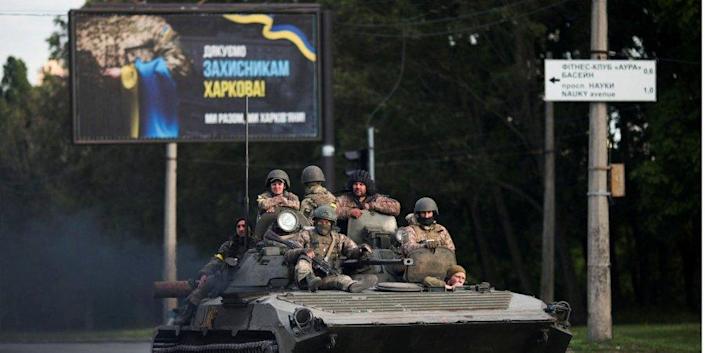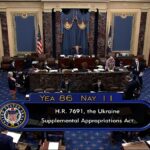
The image of majestic, invincible Russia, with a special civilizational mission, was cultivated in the West. The myth of Russians and Ukrainians as one people was instilled.
The myth about Ukraine, a failed state formed as a result of the collapse of the Soviet empire, is “the greatest geopolitical catastrophe of the twentieth century”, according to Putin. The idea that Ukrainians are a kind of archaic, provincial culture, apart, from a fragment of the culture of a great empire was deliberately spread in Western intellectual and academic circles.
Read also: This is not just war — this is genocide
The Russian imperial narrative brought home the bacon. On the 48th day of the full-scale Russian-Ukrainian war, during which the Russians destroyed Mariupol, part of Kharkiv, settlements of the Kyiv region, and killed about 20,000 inhabitants of Mariupol alone, French President Emmanuel Macron refused to call Russian atrocities “genocide”, and considers Russians and Ukrainians brotherly nations. This statement by Macron is quite symptomatic, as it is a reflection of the long-term influence of Russian state propaganda on Europe.
Representatives of foreign intelligence reported that the Russians would take Kyiv within a few days, and foreign governments offered Zelensky and the government to go into exile. In the eyes of many Europeans, the strength and invincibility of the Russian army were non-questionable until early April, when the Russians suffered a strategic defeat in the north of Ukraine and failed even to approach Kyiv.
Of course, it is way too early to talk about victory over the Russian army. However, now is the time to draw readers’ attention to the main myths that the Kremlin is cultivating in the West while continuing the real genocide of the Ukrainian people.
Myth 1. Russians should not be collectively responsible for the war because they are also “victims of the regime”
Russians are widely spreading the narrative that sanctions and the cessation of foreign business in Russia do not affect the “elite” who started the war but the “ordinary Russian people” who allegedly did not start the war. The realities suggest otherwise.
For decades, Russian society has allowed Putin to act as an aggressor and supported his actions. With the tacit consent of the majority of Russians, two military campaigns took place in Chechnya, the war in Georgia, Syria, and now in Ukraine.
According to the Russian Public Opinion Research Center (VCIOM), as of April 5, 78% of Russians support Vladimir Putin’s actions, and 74% approve of his decision to attack Ukraine. This is confirmed by numerous interviews with passers-by on the streets of Russian cities.
Moreover, in accordance with another survey, 86,6% of Russians support the assault on the territory of the EU, including Estonia, Latvia, Lithuania, the Czech Republic, Bulgaria, Poland, Slovakia and others. At the same time, 75% of respondents tolerate the use of Russian nuclear weapons.
Read also: Now that Russia’s May 9th is behind us, what could happen next?
Telephone conversations between Russian invaders in Ukraine and their families in Russia, intercepted by Ukrainian special services, are often impressive. During the talks, Russian women encourage the killing of Ukrainians, the looting of Ukrainian homes and the rape of Ukrainian women.
The murders, tortures and rapes brought to Ukrainian soil by the Russian soldiers from all over Russia cannot be equated with the “suffering” of Russian citizens due to the impossibility of cashless payment in stores or the lack of Coca-Cola.
Myth 2. Russia is a superpower
For decades, the Russian Federation has cultivated and exported its own image of the invincible centre of the bipolar world. It was assisted in this by a well-funded petrodollar propaganda machine and the availability of nuclear weapons. This status has become entrenched in the world consciousness: many world leaders have believed that Ukraine has no chance against Russia. Until February 24, 2022.
The full-scale Russian-Ukrainian war has been going on for two months, during which Russia managed to conquer only one major city – Kherson, which was occupied in the first days of the war. A month after the beginning of the invasion, Russian troops suffered huge losses and were forced to withdraw completely from the northern regions of Ukraine – Kyiv, Chernihiv, and Sumy. And on April 14, the flagship of the Russian navy, the cruiser “Moskva”, was sent to the bottom.
Thus, Russia has miscalculated – from the expectation that the Ukrainian people will meet the occupiers with flowers to the capabilities of its own army, plagued by corruption and low morale.
It should be noted that Russia is waging a completely barbaric war, hitting civilian targets, executing civilians and burning their bodies in mobile crematoria, looting, shelling humanitarian corridors, raping women, and kidnapping Ukrainian children.
The country and its government, which is committing mass war crimes in 2022 due to its inability to achieve military victories and successfully export only gas, oil, and war, shall not be considered a superpower.
Read also: Ten reasons why Ukraine’s victory over Russia is crucial for the world
Myth 3. Russians and Ukrainians are one people
Russian President Vladimir Putin wrote about this in his article “On the Historical Unity of Russians and Ukrainians” in July 2021, apparently preparing the ground for a large-scale invasion of Ukraine.
According to historians and anti-disinformation experts, Putin’s thesis had no historical basis and is nothing more than a pseudo-scientific imperial narrative that Russia has been spreading in Ukraine for decades, forming a basis for the destruction of the sovereignty.
Timothy Snyder stated that Putin’s thesis “…is not the story about the future, it’s a story about the past, and here we see something characteristic about Mr Putin’s regime. There is no future in the way that Mr Putin talks about Russia. …The kleptocratic regime fills the space of politics where there is no future, with the past”.
A poll conducted in Ukraine in July 2021 shows that 70% of Ukrainians disagreed with Putin’s thesis. Only 12.5% of Ukrainians supported it – mostly people over 60, mostly from the eastern regions of Ukraine, who have always been exposed to more pro-Russian influence, as well as parishioners of the Moscow Patriarchate church, whose priests have repeatedly called for a “reunion of a younger brother with older”.
On April 6, the sociological group Rating conducted a poll, according to which 91% of Ukrainians do not support the thesis that “Russians and Ukrainians are one people”, and 80% are proud of Ukraine.
For years, the Russian Federation has used the term “people” to justify its territorial claims and stressed that it has the right to “protect” Russian-speaking citizens (however, it is unclear from whom) wherever they live.
The Russians themselves believed in this myth, despite the fact that they belong to very different ethnic groups – Buryats, Ingush, Chukchi, Bashkirs, and Chechens, who have their own language and traditions – and that is why they constantly tried to impose it on others, including Ukrainians.
Myth 4. Russia has a “historic title” over Ukrainian land
Vladimir Putin has repeatedly stated that Ukraine was once created by Vladimir Lenin, and before that, it was originally Russian territory. He stated this despite the fact that the first mention of Moscow dates back to 1147, while Kyivan Rus, at the end of X – at the beginning of XI century, had already become one of the political and cultural centers of Eastern Europe.
Of course, historically, Ukraine was connected with Russia, but it was always a time of enslavement or repression of the Ukrainian people:
-
liquidation of the Zaporozhian Sich in 1775 (destruction of the Ukrainian Cossack army and Cossack autonomy by Russian troops by order of Empress Catherine II);
-
the “Red Terror” of the Bolsheviks and Stalin’s repressions of 1918-1953 (mass crimes against humanity: political repression, executions, deportations, and imprisonment of hundreds of thousands of Ukrainians);
-
the Holodomor of 1933-1932 (from which died, according to various estimates, from 4 to 7 millions Ukrainians), the “Executed Renaissance” in the 1930s (as a result of which 80% of the Ukrainian creative intelligentsia was arrested, sent to concentration camps or executed);
-
arrests of Ukrainian intellectuals in the 1970s (arrests, incarceration and imprisonment in special hospitals). In total, according to the Ukrainian Crisis Media Center, 10 million Ukrainians fell victim to Soviet repression.
While decolonization in Europe came to an end in the twentieth century, Russians still do not lose their imperial ambitions to “gather territory.” The Russian Federation, which constantly “looks back” at the “greatness” of the USSR and the borders of tsarist Russia, lags behind the worldview of European civilization, which traveled its way of decolonization in the 50-70s.
Myth 5. Under no circumstances will the war spread beyond Ukraine
86.6% of Russians support the potential attack on the territory of the European Union, the sociological survey indicates. Threats to the sovereignty of, for example, Finland and Poland are already being heard on official Russian TV channels and even during speeches by politicians and diplomats.
Despite such sentiments of Russian society and government in Russia, Europe has long chosen not to notice the threat, hoping that Ukraine will remain a “buffer zone” and a “shield” beyond which Russian aggression will not go.
Read also: Kremlin’s mouthpiece RIA publishes Russian fascist manifesto
It may be hard for Europeans to believe that Russia can attack their countries. The West appeased Putin when he directly threatened world security at the 2007 Munich Security Conference.
The West also appeased Putin after Russia invaded Georgia when his aggression became apparent. It was just as difficult until February 2022 to realize that Russia was capable of going to full-scale war with Ukraine.
The threat is well understood by countries that share a border with Russia and have once suffered from its aggression – Finland, Latvia, Lithuania, Estonia – which is why they are among the most active in helping Ukraine.
Obviously, it is painful for European leaders to sever economically advantageous relations with Russia, which have been developing for decades. They are not always ready to do so even after the complete destruction of Mariupol and a number of other Ukrainian cities, the massacres in Bucha, Irpin and Hostomel, and a whole bunch of war crimes because they are convinced that their peoples are safe.
But European leaders were also convinced of security when they de facto allowed the Third Reich to occupy the Sudetenland in order to curb Hitler’s appetites. Every European knows what happened next. Quick and severe actions could have saved the lives of millions of people.
Myth 6. Russian culture is not to blame. Russian culture should not be “canceled”
From the very beginning of Russian aggression, Ukrainians appealed to the Western world and its cultural institutions to “Cancel Russian Culture”. The policy of canceling the culture of the aggressor country has several dimensions.
Firstly, these are perfectly fair sanctions against Russian cultural figures and institutions that support or support the Putin regime.
Secondly, the recognition of the fact that the Russian war against Ukraine is neo-colonial. And Russian culture has always been a part of Russian colonialism.
It is part of the mental firmware of the Russian Empire. No matter how elegantly imperialism is disguised in Tolstoy’s novels, Pushkin’s poetry, Russian classical music, or Russian ballet.
The myth of a special “mysterious Russian soul” that Russia has imposed on the world through literature is one of the most dangerous traps that has kept the reader from seeing reality. Russian classical literature has always justified invasion, glorified power, and denied freedom, and Russian classics emphasized their superiority over colonized peoples. This is explored in detail in the book by American researcher Ewa Thompson “Imperial Knowledge: Russian Literature and Colonialism”.
And finally, the third dimension. Culture is, first of all, a system of values, the worldview of a particular person and the whole nation. The Merriam-Webster Dictionary defines the “culture” as the set of values, conventions, or social practices associated with a particular field, activity, or societal characteristic.
Read also: Canadian parliament recognizes Russia’s acts of genocide against Ukrainians
This dimension of Russian culture was seen after the de-occupation of Ukrainian cities in the north and northeast of Ukraine. Rape of children and the elderly, tanks full of stolen property, shelled schools, where Russian soldiers set up toilets in the middle of the classrooms, and burned down maternity hospitals.
No less eloquent are the results of Russian activity in the still occupied territories – concentration camps in Mariupol, executions, and mass burials of corpses. All the facts suggest that Russian culture “as the set of values, conventions, or social practices” not only failed to prevent war with the neighboring state but also encouraged Russian soldiers to indescribable cruelty and repetition of Nazi practices.
Myth 7. Azov is a neo-Nazi regiment / Nazism is widespread in Ukraine
One of the most popular and controversial topics in the international media is Azov and its far-right or neo-Nazi ideology. This topic has become even more relevant, given that the media attention is focused on the tragedy in Mariupol, a city defended by Azov fighters.
I will not be able to argue better about Azov than Vyacheslav Likhachev, a member of the Expert Council of the Center for Civil Liberties, whose article I strongly recommend reading. However, I can cite some of his most eloquent theses.
Azov is a unit of the National Guard and does not have its own ideology or selection “on ideological grounds.” Some of the founders of Azov in 2014 indeed had right-wing radical or neo-Nazi views, but this was only part of the founders.
Far-right fighters either left Azov voluntarily or were expelled from the unit by the new command in 2017. Now Azov consists of fighters of various nationalities, including Tatars, Jews, and Russians, selected solely on the basis of professionalism.
Why is the myth of “neo-Nazi Azov” circulating in the media now? Primarily because it attracts with its controversy. According to the manipulation, on the one hand, Azov is one of the best weapons of Ukraine, protecting civilians and deterring Russian aggression, but on the other hand, this weapon is far-right and therefore reprehensible.
Such manipulation provides a good basis for reflection and discussion because, according to Vyacheslav Likhachev, “Western society tends to reject the black-and-white vision of the world and to consider more complex models. Typical of this vision is to look for the truth somewhere in the middle, between the polar points of view. But the truth, as Adam Michnik said, does not lie in the middle. It lies where it lies”.
Read also: Russia’s genocide handbook
At the same time, the myth of “neo-Nazi Azov” was initiated and supported by Russian propaganda in Russia and Europe. This myth plays into the hands of the Russian narrative that Ukraine is a “Nazi state” and must be “denazified.” In particular, by marking Ukrainian defenders as “neo-Nazis”, Russia is trying to persuade the West to stop supporting Ukraine, knowing that the issue is quite sensitive for Europe.
It is obvious to the entire civilized world that Ukraine has nothing to do with Nazism and that Russia’s accusations are absurd.
This is confirmed at least by the fact that Ukrainian President Volodymyr Zelensky is Jewish, and right-wing radical parties have never had widespread public support and representation in Parliament.




